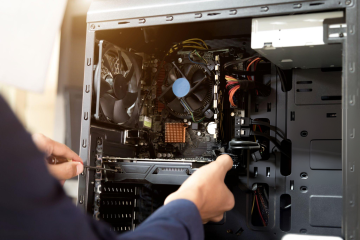The world of computing is undergoing a revolutionary transformation, driven by groundbreaking advancements in technology. From the integration of Artificial Intelligence (AI) in everyday applications to the exploratory realms of Quantum Computing and Virtual Reality (VR), these technologies are not just reshaping the landscape of computing but also redefining its future. In this extensive guide, we’ll delve into each of these technologies, exploring their current state, potential impact, and the exciting possibilities they hold for the future of personal computing.
Introduction to Emerging Technologies in Computing
Emerging technologies in computing represent a confluence of different scientific disciplines and innovative thinking. These technologies are setting the stage for a new era in computing, marked by enhanced capabilities, unprecedented efficiency, and transformative user experiences.
Overview of Key Technologies
| Technology | Core Concept | Potential Impact |
|---|---|---|
| Artificial Intelligence (AI) | Creating machines capable of intelligent behavior. | Automating complex tasks, enhancing decision-making. |
| Virtual Reality (VR) | Immersive, interactive digital environments. | Transforming entertainment, education, and design. |
| Quantum Computing | Processing data using quantum-mechanical phenomena. | Solving complex problems faster than classical computers. |
How AI is Changing Computer Troubleshooting
AI is revolutionizing the field of computer troubleshooting by introducing smart, automated solutions that significantly reduce the time and effort required in diagnosing and fixing issues. The integration of AI in troubleshooting tools and processes is not only enhancing the efficiency of these tasks but also making them more accessible to non-technical users.
AI-Powered Troubleshooting: Advancements and Applications
- Automated Diagnostics: AI algorithms can quickly analyze system data to identify the root causes of hardware and software issues, often predicting problems before they occur.
- Self-Healing Systems: AI-driven systems are capable of self-diagnosis and repair, automatically fixing common issues without human intervention.
- User-Friendly Interfaces: AI has enabled the development of intuitive, conversational interfaces for troubleshooting, making tech support more accessible and user-friendly.
Real-World Examples:
- AI in System Optimization: Advanced AI tools that optimize system performance by learning user patterns and automatically adjusting settings for optimal operation.
- Predictive Maintenance Software: Applications that use AI to monitor hardware health, predict potential failures, and suggest preventative measures.
The Role of Virtual Reality in Future Computing
VR is poised to revolutionize the way we interact with digital content. By creating fully immersive and interactive environments, VR technology opens up new horizons for gaming, education, and professional collaboration. As VR devices become more affordable and widespread, their impact on personal computing is expected to grow exponentially.
VR’s Transformative Influence
- Educational Immersion: VR’s ability to simulate realistic environments makes it an invaluable tool in education and training, providing experiential learning that traditional methods cannot offer.
- Collaborative Workspaces: Virtual workspaces in VR allow for more interactive and collaborative remote working experiences, bridging geographical gaps and enhancing teamwork.
- Entertainment Evolution: VR is changing the entertainment landscape, offering immersive gaming and movie experiences that blur the line between the digital and real worlds.
Exploring VR Capabilities:
- VR in Medical Training: The use of VR simulations for training surgeons, offering a risk-free environment to practice complex procedures.
- Virtual Reality Meetings: Platforms that enable virtual meetings where participants can interact as if they were in the same physical space, enhancing remote collaboration.
Understanding the Basics of Quantum Computing
Quantum Computing is one of the most exciting frontiers in computing technology. By harnessing the principles of quantum mechanics, quantum computers can process complex data at speeds unattainable by classical computers. This technology holds the promise of massive advancements in various fields, including cryptography, materials science, and complex system modeling.
Quantum Computing Fundamentals
- Principles of Quantum Mechanics: Quantum Computing leverages phenomena like superposition and entanglement to perform operations on data. Unlike classical bits, quantum bits (qubits) can exist in multiple states simultaneously, providing exponential growth in processing power.
- Quantum Algorithms: Algorithms designed for quantum computers can solve certain types of problems much more efficiently than their classical counterparts. This includes complex optimization problems and simulations of quantum physical processes.
Quantum Computing Applications:
- Cryptography: Quantum computers have the potential to break current encryption algorithms, prompting the development of quantum-resistant cryptography.
- Drug Discovery: The ability of quantum computers to simulate molecular structures could revolutionize drug discovery and development, potentially reducing the time and cost involved in bringing new medicines to market.
Discussion: The Future of Personal Computing
As we look to the future, the convergence of AI, VR, and Quantum Computing is set to redefine personal computing in ways we are only beginning to imagine. The impact of these technologies will be felt across all aspects of our digital lives, from the way we work and learn to how we play and interact.
Envisioning Tomorrow’s Computing Landscape
- AI-Enhanced Personalization: Future computing devices will leverage AI to offer highly personalized experiences, adapting to individual user preferences and behaviors.
- Quantum Computing in Everyday Life: While currently limited to specialized applications, the future may see quantum computing integrated into everyday devices, offering unprecedented computational power.
- VR as a Standard Interface: VR technology might become a standard interface for personal computing, offering more natural and intuitive ways to interact with digital content.
In conclusion, emerging technologies are reshaping the landscape of computing, bringing about a wave of innovations that promise to transform our relationship with technology. As we embrace these changes, the future of personal computing looks more exciting than ever. The potential is limitless, and the journey has just begun.



